ENVS 387/557: Geographies of Resistance and Social Movements
VerifiedAdded on 2020/05/11
|14
|3554
|42
Report
AI Summary
This report, prepared for ENVS 387/557, examines social movements through the lens of geographies of resistance, focusing on China's political landscape. It provides a policy brief overview, discussing the views of opponents of social movements and countermovements. The report delves into issues of contention, including protest technologies developed by social movements, historical and contemporary examples, and responses open to opponents of social movements. It highlights the use of media, the internet, and social media in protest, the importance of voting, and the role of social movements in improving lives and defending rights. The report emphasizes the impact of politicking, the need for democratic rights, and the significance of addressing bad governance through various forms of resistance and political actions.
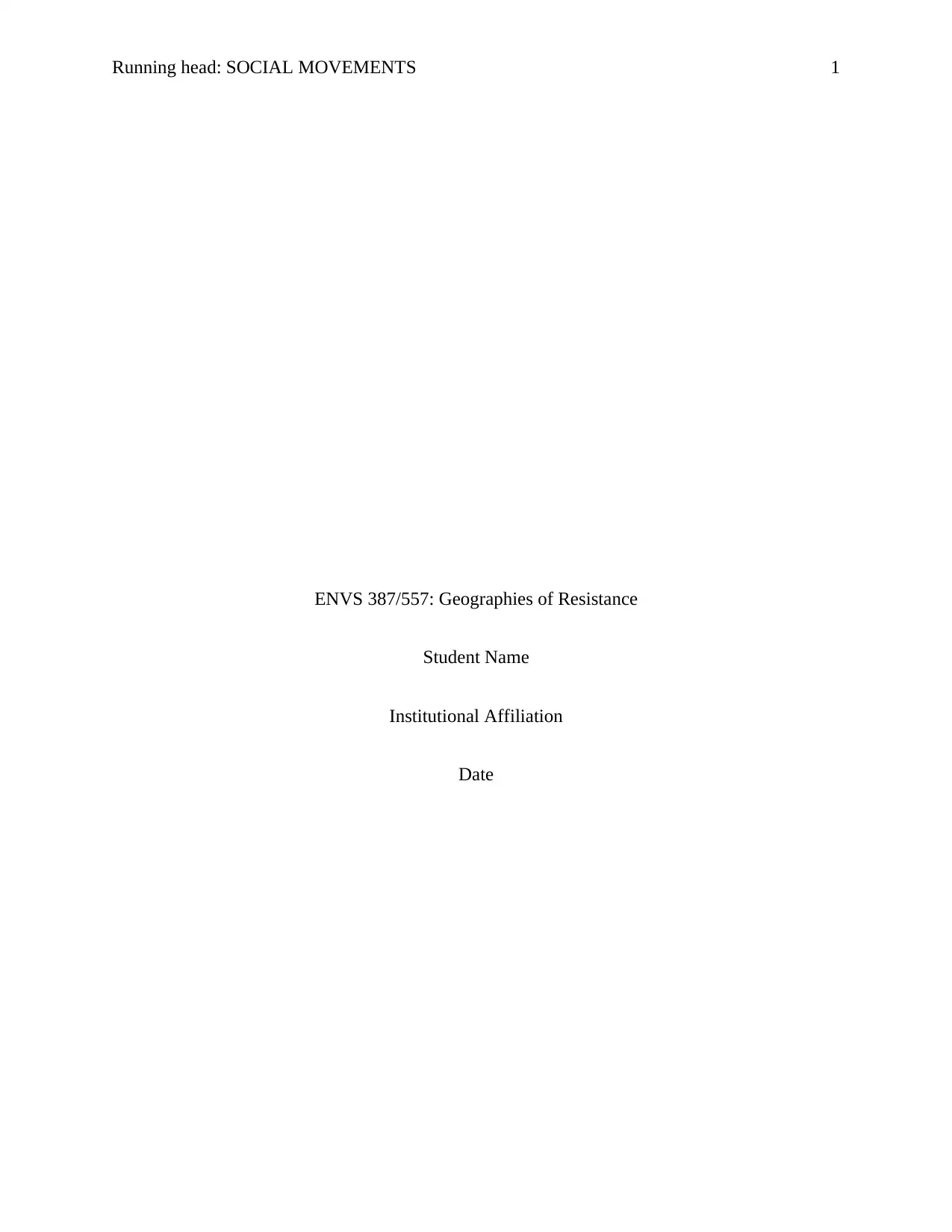
Running head: SOCIAL MOVEMENTS 1
ENVS 387/557: Geographies of Resistance
Student Name
Institutional Affiliation
Date
ENVS 387/557: Geographies of Resistance
Student Name
Institutional Affiliation
Date
Paraphrase This Document
Need a fresh take? Get an instant paraphrase of this document with our AI Paraphraser
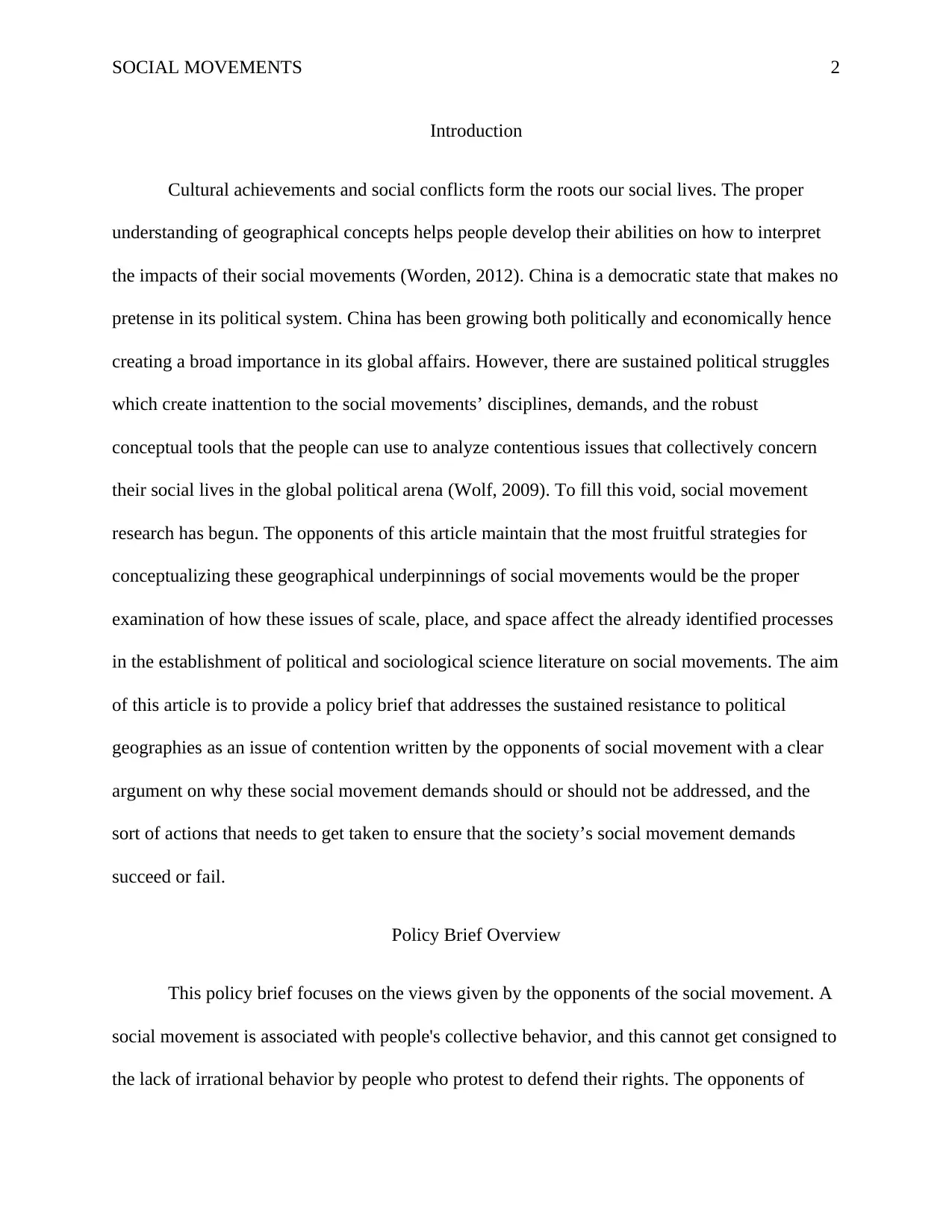
SOCIAL MOVEMENTS 2
Introduction
Cultural achievements and social conflicts form the roots our social lives. The proper
understanding of geographical concepts helps people develop their abilities on how to interpret
the impacts of their social movements (Worden, 2012). China is a democratic state that makes no
pretense in its political system. China has been growing both politically and economically hence
creating a broad importance in its global affairs. However, there are sustained political struggles
which create inattention to the social movements’ disciplines, demands, and the robust
conceptual tools that the people can use to analyze contentious issues that collectively concern
their social lives in the global political arena (Wolf, 2009). To fill this void, social movement
research has begun. The opponents of this article maintain that the most fruitful strategies for
conceptualizing these geographical underpinnings of social movements would be the proper
examination of how these issues of scale, place, and space affect the already identified processes
in the establishment of political and sociological science literature on social movements. The aim
of this article is to provide a policy brief that addresses the sustained resistance to political
geographies as an issue of contention written by the opponents of social movement with a clear
argument on why these social movement demands should or should not be addressed, and the
sort of actions that needs to get taken to ensure that the society’s social movement demands
succeed or fail.
Policy Brief Overview
This policy brief focuses on the views given by the opponents of the social movement. A
social movement is associated with people's collective behavior, and this cannot get consigned to
the lack of irrational behavior by people who protest to defend their rights. The opponents of
Introduction
Cultural achievements and social conflicts form the roots our social lives. The proper
understanding of geographical concepts helps people develop their abilities on how to interpret
the impacts of their social movements (Worden, 2012). China is a democratic state that makes no
pretense in its political system. China has been growing both politically and economically hence
creating a broad importance in its global affairs. However, there are sustained political struggles
which create inattention to the social movements’ disciplines, demands, and the robust
conceptual tools that the people can use to analyze contentious issues that collectively concern
their social lives in the global political arena (Wolf, 2009). To fill this void, social movement
research has begun. The opponents of this article maintain that the most fruitful strategies for
conceptualizing these geographical underpinnings of social movements would be the proper
examination of how these issues of scale, place, and space affect the already identified processes
in the establishment of political and sociological science literature on social movements. The aim
of this article is to provide a policy brief that addresses the sustained resistance to political
geographies as an issue of contention written by the opponents of social movement with a clear
argument on why these social movement demands should or should not be addressed, and the
sort of actions that needs to get taken to ensure that the society’s social movement demands
succeed or fail.
Policy Brief Overview
This policy brief focuses on the views given by the opponents of the social movement. A
social movement is associated with people's collective behavior, and this cannot get consigned to
the lack of irrational behavior by people who protest to defend their rights. The opponents of
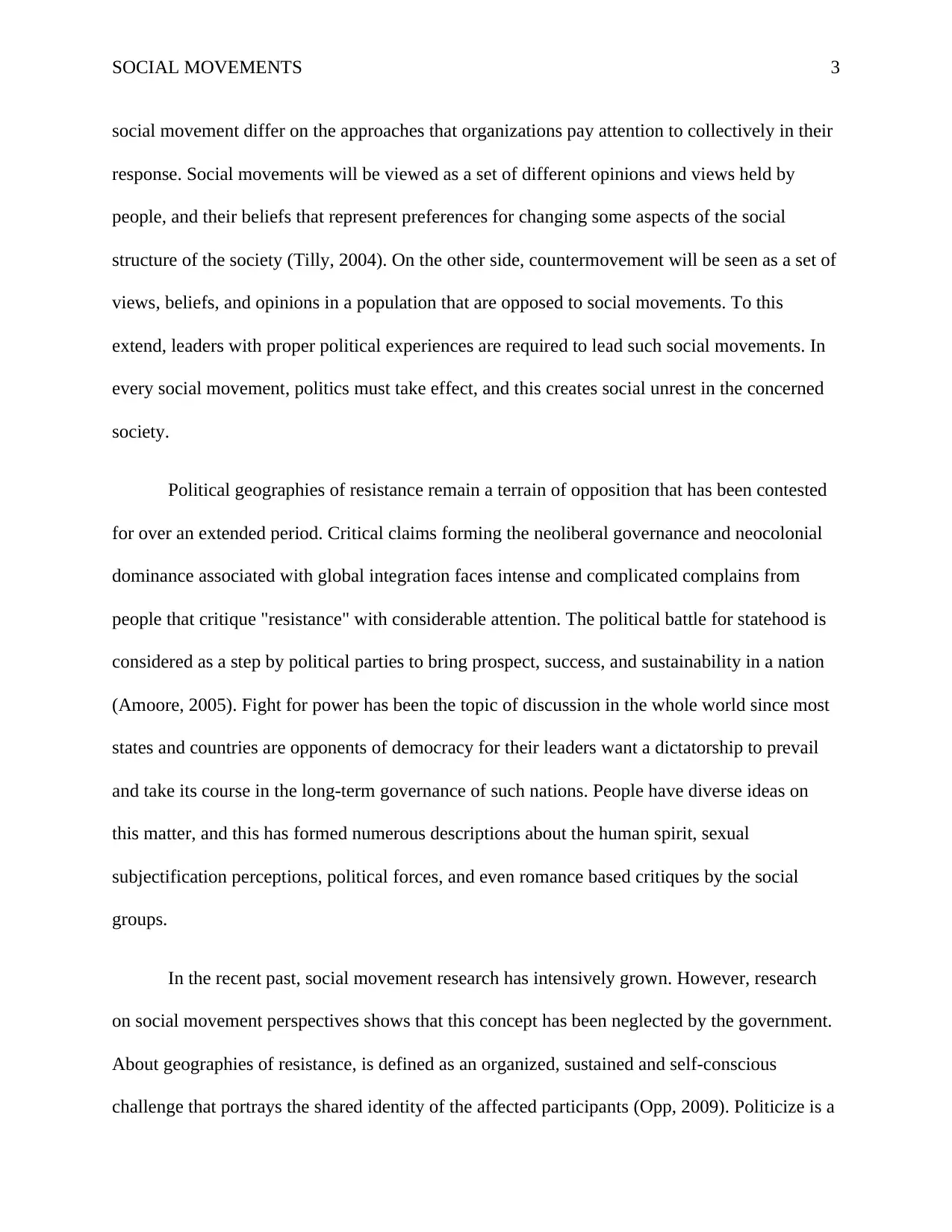
SOCIAL MOVEMENTS 3
social movement differ on the approaches that organizations pay attention to collectively in their
response. Social movements will be viewed as a set of different opinions and views held by
people, and their beliefs that represent preferences for changing some aspects of the social
structure of the society (Tilly, 2004). On the other side, countermovement will be seen as a set of
views, beliefs, and opinions in a population that are opposed to social movements. To this
extend, leaders with proper political experiences are required to lead such social movements. In
every social movement, politics must take effect, and this creates social unrest in the concerned
society.
Political geographies of resistance remain a terrain of opposition that has been contested
for over an extended period. Critical claims forming the neoliberal governance and neocolonial
dominance associated with global integration faces intense and complicated complains from
people that critique "resistance" with considerable attention. The political battle for statehood is
considered as a step by political parties to bring prospect, success, and sustainability in a nation
(Amoore, 2005). Fight for power has been the topic of discussion in the whole world since most
states and countries are opponents of democracy for their leaders want a dictatorship to prevail
and take its course in the long-term governance of such nations. People have diverse ideas on
this matter, and this has formed numerous descriptions about the human spirit, sexual
subjectification perceptions, political forces, and even romance based critiques by the social
groups.
In the recent past, social movement research has intensively grown. However, research
on social movement perspectives shows that this concept has been neglected by the government.
About geographies of resistance, is defined as an organized, sustained and self-conscious
challenge that portrays the shared identity of the affected participants (Opp, 2009). Politicize is a
social movement differ on the approaches that organizations pay attention to collectively in their
response. Social movements will be viewed as a set of different opinions and views held by
people, and their beliefs that represent preferences for changing some aspects of the social
structure of the society (Tilly, 2004). On the other side, countermovement will be seen as a set of
views, beliefs, and opinions in a population that are opposed to social movements. To this
extend, leaders with proper political experiences are required to lead such social movements. In
every social movement, politics must take effect, and this creates social unrest in the concerned
society.
Political geographies of resistance remain a terrain of opposition that has been contested
for over an extended period. Critical claims forming the neoliberal governance and neocolonial
dominance associated with global integration faces intense and complicated complains from
people that critique "resistance" with considerable attention. The political battle for statehood is
considered as a step by political parties to bring prospect, success, and sustainability in a nation
(Amoore, 2005). Fight for power has been the topic of discussion in the whole world since most
states and countries are opponents of democracy for their leaders want a dictatorship to prevail
and take its course in the long-term governance of such nations. People have diverse ideas on
this matter, and this has formed numerous descriptions about the human spirit, sexual
subjectification perceptions, political forces, and even romance based critiques by the social
groups.
In the recent past, social movement research has intensively grown. However, research
on social movement perspectives shows that this concept has been neglected by the government.
About geographies of resistance, is defined as an organized, sustained and self-conscious
challenge that portrays the shared identity of the affected participants (Opp, 2009). Politicize is a
⊘ This is a preview!⊘
Do you want full access?
Subscribe today to unlock all pages.

Trusted by 1+ million students worldwide
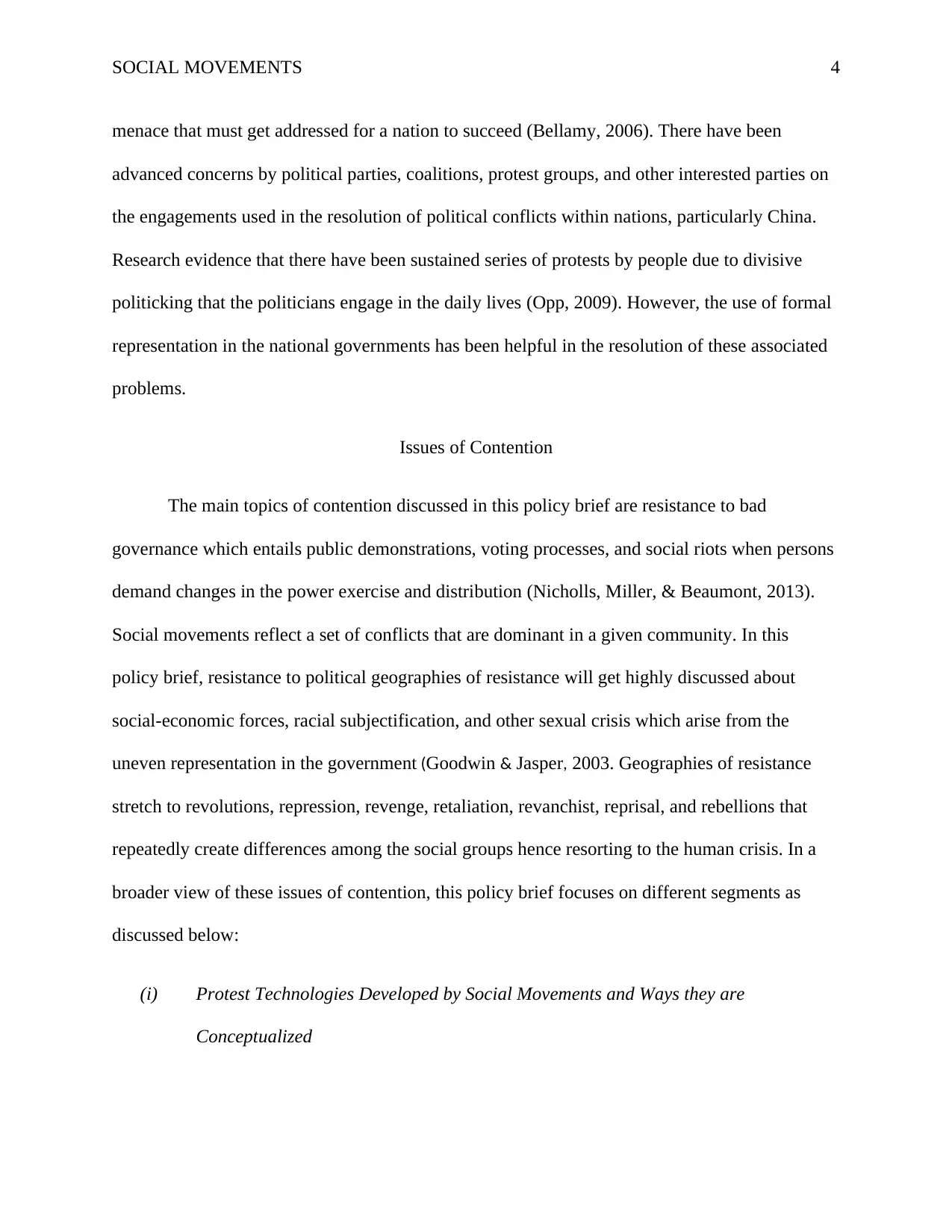
SOCIAL MOVEMENTS 4
menace that must get addressed for a nation to succeed (Bellamy, 2006). There have been
advanced concerns by political parties, coalitions, protest groups, and other interested parties on
the engagements used in the resolution of political conflicts within nations, particularly China.
Research evidence that there have been sustained series of protests by people due to divisive
politicking that the politicians engage in the daily lives (Opp, 2009). However, the use of formal
representation in the national governments has been helpful in the resolution of these associated
problems.
Issues of Contention
The main topics of contention discussed in this policy brief are resistance to bad
governance which entails public demonstrations, voting processes, and social riots when persons
demand changes in the power exercise and distribution (Nicholls, Miller, & Beaumont, 2013).
Social movements reflect a set of conflicts that are dominant in a given community. In this
policy brief, resistance to political geographies of resistance will get highly discussed about
social-economic forces, racial subjectification, and other sexual crisis which arise from the
uneven representation in the government (Goodwin & Jasper, 2003. Geographies of resistance
stretch to revolutions, repression, revenge, retaliation, revanchist, reprisal, and rebellions that
repeatedly create differences among the social groups hence resorting to the human crisis. In a
broader view of these issues of contention, this policy brief focuses on different segments as
discussed below:
(i) Protest Technologies Developed by Social Movements and Ways they are
Conceptualized
menace that must get addressed for a nation to succeed (Bellamy, 2006). There have been
advanced concerns by political parties, coalitions, protest groups, and other interested parties on
the engagements used in the resolution of political conflicts within nations, particularly China.
Research evidence that there have been sustained series of protests by people due to divisive
politicking that the politicians engage in the daily lives (Opp, 2009). However, the use of formal
representation in the national governments has been helpful in the resolution of these associated
problems.
Issues of Contention
The main topics of contention discussed in this policy brief are resistance to bad
governance which entails public demonstrations, voting processes, and social riots when persons
demand changes in the power exercise and distribution (Nicholls, Miller, & Beaumont, 2013).
Social movements reflect a set of conflicts that are dominant in a given community. In this
policy brief, resistance to political geographies of resistance will get highly discussed about
social-economic forces, racial subjectification, and other sexual crisis which arise from the
uneven representation in the government (Goodwin & Jasper, 2003. Geographies of resistance
stretch to revolutions, repression, revenge, retaliation, revanchist, reprisal, and rebellions that
repeatedly create differences among the social groups hence resorting to the human crisis. In a
broader view of these issues of contention, this policy brief focuses on different segments as
discussed below:
(i) Protest Technologies Developed by Social Movements and Ways they are
Conceptualized
Paraphrase This Document
Need a fresh take? Get an instant paraphrase of this document with our AI Paraphraser
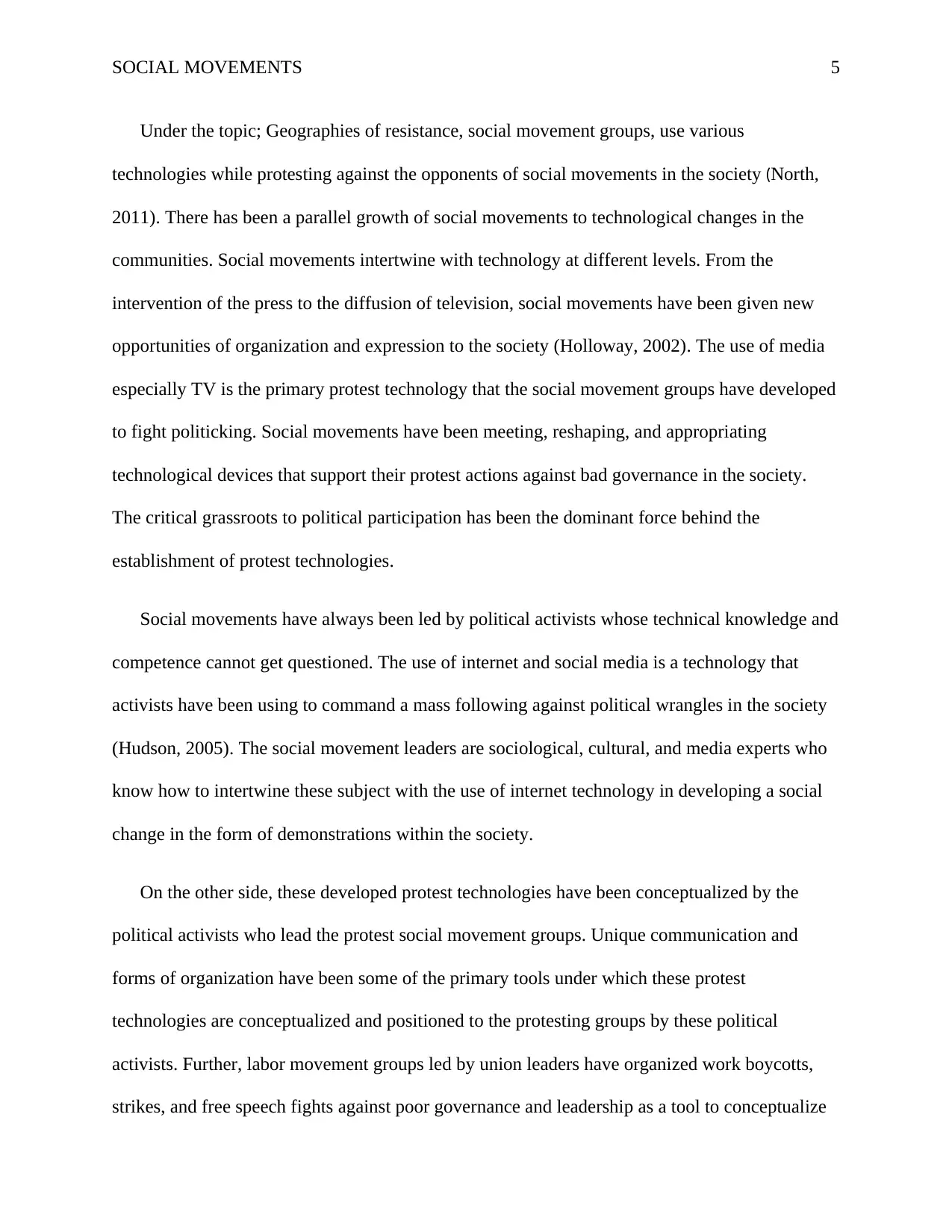
SOCIAL MOVEMENTS 5
Under the topic; Geographies of resistance, social movement groups, use various
technologies while protesting against the opponents of social movements in the society (North,
2011). There has been a parallel growth of social movements to technological changes in the
communities. Social movements intertwine with technology at different levels. From the
intervention of the press to the diffusion of television, social movements have been given new
opportunities of organization and expression to the society (Holloway, 2002). The use of media
especially TV is the primary protest technology that the social movement groups have developed
to fight politicking. Social movements have been meeting, reshaping, and appropriating
technological devices that support their protest actions against bad governance in the society.
The critical grassroots to political participation has been the dominant force behind the
establishment of protest technologies.
Social movements have always been led by political activists whose technical knowledge and
competence cannot get questioned. The use of internet and social media is a technology that
activists have been using to command a mass following against political wrangles in the society
(Hudson, 2005). The social movement leaders are sociological, cultural, and media experts who
know how to intertwine these subject with the use of internet technology in developing a social
change in the form of demonstrations within the society.
On the other side, these developed protest technologies have been conceptualized by the
political activists who lead the protest social movement groups. Unique communication and
forms of organization have been some of the primary tools under which these protest
technologies are conceptualized and positioned to the protesting groups by these political
activists. Further, labor movement groups led by union leaders have organized work boycotts,
strikes, and free speech fights against poor governance and leadership as a tool to conceptualize
Under the topic; Geographies of resistance, social movement groups, use various
technologies while protesting against the opponents of social movements in the society (North,
2011). There has been a parallel growth of social movements to technological changes in the
communities. Social movements intertwine with technology at different levels. From the
intervention of the press to the diffusion of television, social movements have been given new
opportunities of organization and expression to the society (Holloway, 2002). The use of media
especially TV is the primary protest technology that the social movement groups have developed
to fight politicking. Social movements have been meeting, reshaping, and appropriating
technological devices that support their protest actions against bad governance in the society.
The critical grassroots to political participation has been the dominant force behind the
establishment of protest technologies.
Social movements have always been led by political activists whose technical knowledge and
competence cannot get questioned. The use of internet and social media is a technology that
activists have been using to command a mass following against political wrangles in the society
(Hudson, 2005). The social movement leaders are sociological, cultural, and media experts who
know how to intertwine these subject with the use of internet technology in developing a social
change in the form of demonstrations within the society.
On the other side, these developed protest technologies have been conceptualized by the
political activists who lead the protest social movement groups. Unique communication and
forms of organization have been some of the primary tools under which these protest
technologies are conceptualized and positioned to the protesting groups by these political
activists. Further, labor movement groups led by union leaders have organized work boycotts,
strikes, and free speech fights against poor governance and leadership as a tool to conceptualize
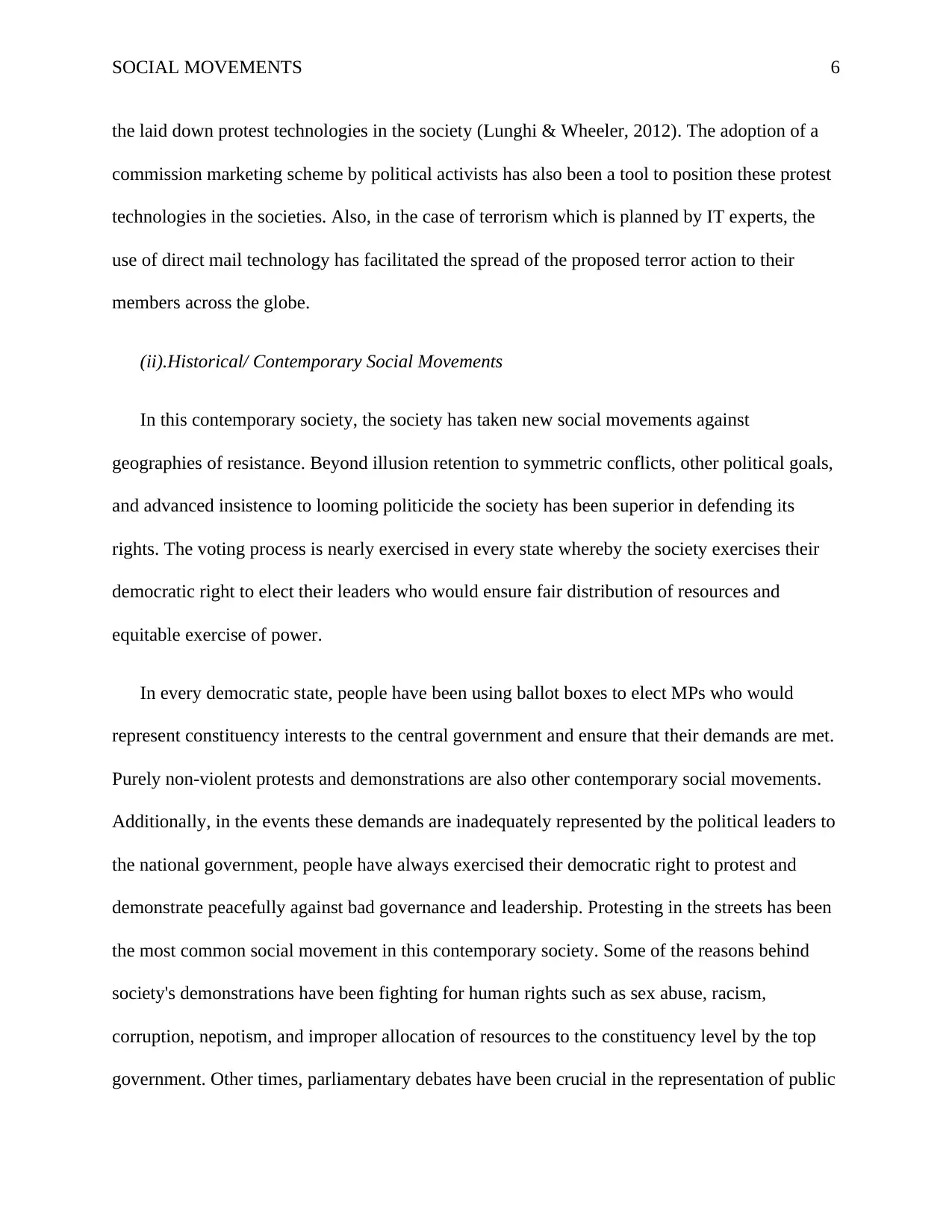
SOCIAL MOVEMENTS 6
the laid down protest technologies in the society (Lunghi & Wheeler, 2012). The adoption of a
commission marketing scheme by political activists has also been a tool to position these protest
technologies in the societies. Also, in the case of terrorism which is planned by IT experts, the
use of direct mail technology has facilitated the spread of the proposed terror action to their
members across the globe.
(ii).Historical/ Contemporary Social Movements
In this contemporary society, the society has taken new social movements against
geographies of resistance. Beyond illusion retention to symmetric conflicts, other political goals,
and advanced insistence to looming politicide the society has been superior in defending its
rights. The voting process is nearly exercised in every state whereby the society exercises their
democratic right to elect their leaders who would ensure fair distribution of resources and
equitable exercise of power.
In every democratic state, people have been using ballot boxes to elect MPs who would
represent constituency interests to the central government and ensure that their demands are met.
Purely non-violent protests and demonstrations are also other contemporary social movements.
Additionally, in the events these demands are inadequately represented by the political leaders to
the national government, people have always exercised their democratic right to protest and
demonstrate peacefully against bad governance and leadership. Protesting in the streets has been
the most common social movement in this contemporary society. Some of the reasons behind
society's demonstrations have been fighting for human rights such as sex abuse, racism,
corruption, nepotism, and improper allocation of resources to the constituency level by the top
government. Other times, parliamentary debates have been crucial in the representation of public
the laid down protest technologies in the society (Lunghi & Wheeler, 2012). The adoption of a
commission marketing scheme by political activists has also been a tool to position these protest
technologies in the societies. Also, in the case of terrorism which is planned by IT experts, the
use of direct mail technology has facilitated the spread of the proposed terror action to their
members across the globe.
(ii).Historical/ Contemporary Social Movements
In this contemporary society, the society has taken new social movements against
geographies of resistance. Beyond illusion retention to symmetric conflicts, other political goals,
and advanced insistence to looming politicide the society has been superior in defending its
rights. The voting process is nearly exercised in every state whereby the society exercises their
democratic right to elect their leaders who would ensure fair distribution of resources and
equitable exercise of power.
In every democratic state, people have been using ballot boxes to elect MPs who would
represent constituency interests to the central government and ensure that their demands are met.
Purely non-violent protests and demonstrations are also other contemporary social movements.
Additionally, in the events these demands are inadequately represented by the political leaders to
the national government, people have always exercised their democratic right to protest and
demonstrate peacefully against bad governance and leadership. Protesting in the streets has been
the most common social movement in this contemporary society. Some of the reasons behind
society's demonstrations have been fighting for human rights such as sex abuse, racism,
corruption, nepotism, and improper allocation of resources to the constituency level by the top
government. Other times, parliamentary debates have been crucial in the representation of public
⊘ This is a preview!⊘
Do you want full access?
Subscribe today to unlock all pages.

Trusted by 1+ million students worldwide
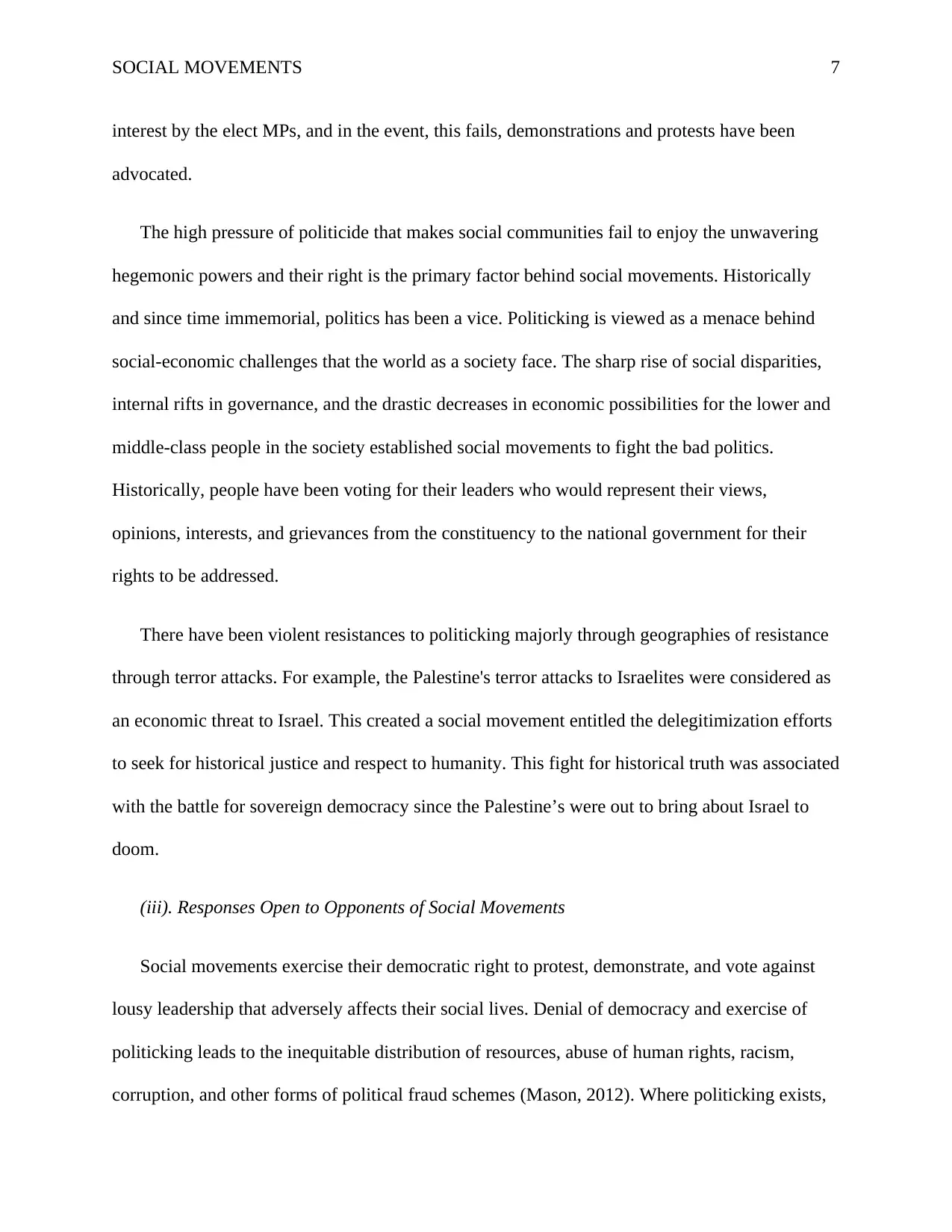
SOCIAL MOVEMENTS 7
interest by the elect MPs, and in the event, this fails, demonstrations and protests have been
advocated.
The high pressure of politicide that makes social communities fail to enjoy the unwavering
hegemonic powers and their right is the primary factor behind social movements. Historically
and since time immemorial, politics has been a vice. Politicking is viewed as a menace behind
social-economic challenges that the world as a society face. The sharp rise of social disparities,
internal rifts in governance, and the drastic decreases in economic possibilities for the lower and
middle-class people in the society established social movements to fight the bad politics.
Historically, people have been voting for their leaders who would represent their views,
opinions, interests, and grievances from the constituency to the national government for their
rights to be addressed.
There have been violent resistances to politicking majorly through geographies of resistance
through terror attacks. For example, the Palestine's terror attacks to Israelites were considered as
an economic threat to Israel. This created a social movement entitled the delegitimization efforts
to seek for historical justice and respect to humanity. This fight for historical truth was associated
with the battle for sovereign democracy since the Palestine’s were out to bring about Israel to
doom.
(iii). Responses Open to Opponents of Social Movements
Social movements exercise their democratic right to protest, demonstrate, and vote against
lousy leadership that adversely affects their social lives. Denial of democracy and exercise of
politicking leads to the inequitable distribution of resources, abuse of human rights, racism,
corruption, and other forms of political fraud schemes (Mason, 2012). Where politicking exists,
interest by the elect MPs, and in the event, this fails, demonstrations and protests have been
advocated.
The high pressure of politicide that makes social communities fail to enjoy the unwavering
hegemonic powers and their right is the primary factor behind social movements. Historically
and since time immemorial, politics has been a vice. Politicking is viewed as a menace behind
social-economic challenges that the world as a society face. The sharp rise of social disparities,
internal rifts in governance, and the drastic decreases in economic possibilities for the lower and
middle-class people in the society established social movements to fight the bad politics.
Historically, people have been voting for their leaders who would represent their views,
opinions, interests, and grievances from the constituency to the national government for their
rights to be addressed.
There have been violent resistances to politicking majorly through geographies of resistance
through terror attacks. For example, the Palestine's terror attacks to Israelites were considered as
an economic threat to Israel. This created a social movement entitled the delegitimization efforts
to seek for historical justice and respect to humanity. This fight for historical truth was associated
with the battle for sovereign democracy since the Palestine’s were out to bring about Israel to
doom.
(iii). Responses Open to Opponents of Social Movements
Social movements exercise their democratic right to protest, demonstrate, and vote against
lousy leadership that adversely affects their social lives. Denial of democracy and exercise of
politicking leads to the inequitable distribution of resources, abuse of human rights, racism,
corruption, and other forms of political fraud schemes (Mason, 2012). Where politicking exists,
Paraphrase This Document
Need a fresh take? Get an instant paraphrase of this document with our AI Paraphraser
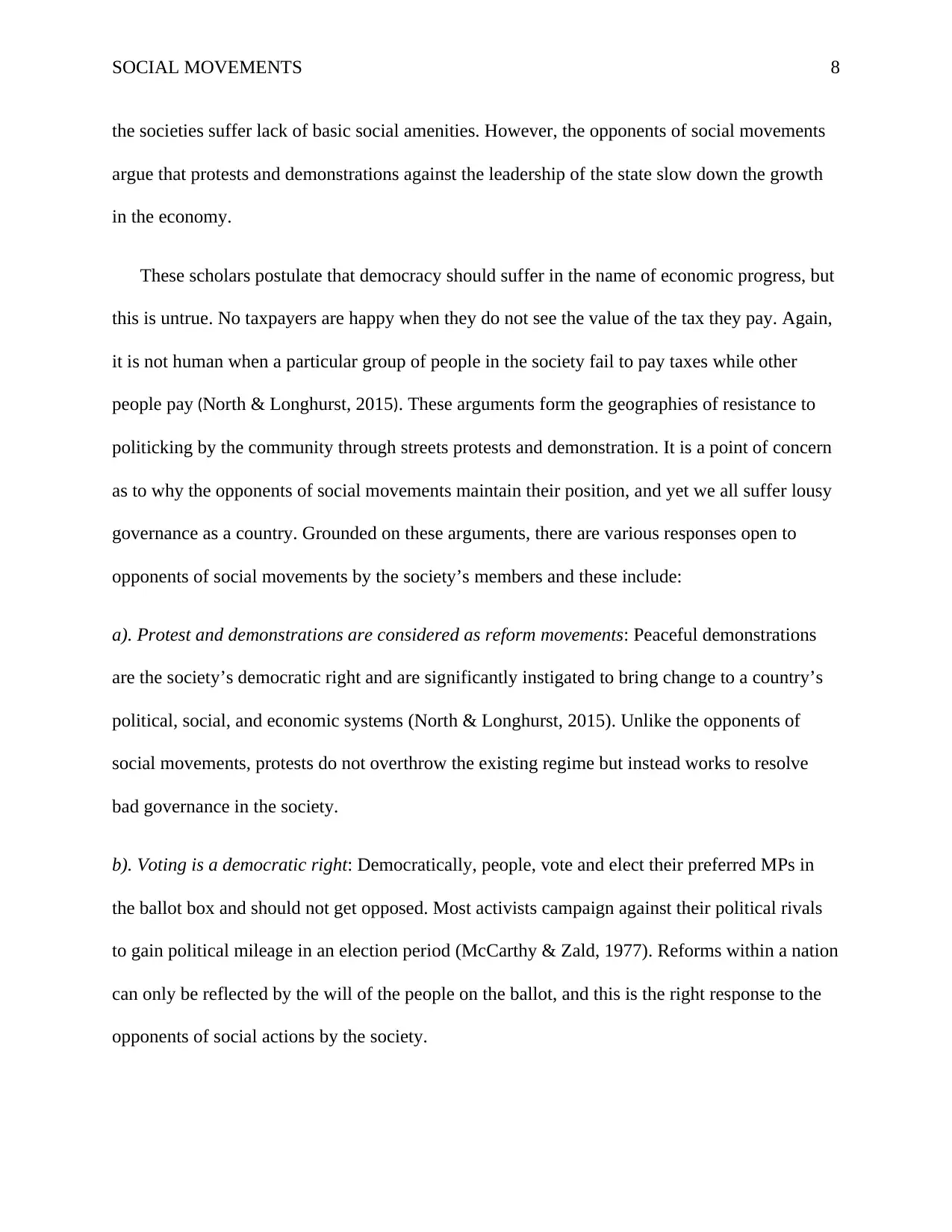
SOCIAL MOVEMENTS 8
the societies suffer lack of basic social amenities. However, the opponents of social movements
argue that protests and demonstrations against the leadership of the state slow down the growth
in the economy.
These scholars postulate that democracy should suffer in the name of economic progress, but
this is untrue. No taxpayers are happy when they do not see the value of the tax they pay. Again,
it is not human when a particular group of people in the society fail to pay taxes while other
people pay (North & Longhurst, 2015). These arguments form the geographies of resistance to
politicking by the community through streets protests and demonstration. It is a point of concern
as to why the opponents of social movements maintain their position, and yet we all suffer lousy
governance as a country. Grounded on these arguments, there are various responses open to
opponents of social movements by the society’s members and these include:
a). Protest and demonstrations are considered as reform movements: Peaceful demonstrations
are the society’s democratic right and are significantly instigated to bring change to a country’s
political, social, and economic systems (North & Longhurst, 2015). Unlike the opponents of
social movements, protests do not overthrow the existing regime but instead works to resolve
bad governance in the society.
b). Voting is a democratic right: Democratically, people, vote and elect their preferred MPs in
the ballot box and should not get opposed. Most activists campaign against their political rivals
to gain political mileage in an election period (McCarthy & Zald, 1977). Reforms within a nation
can only be reflected by the will of the people on the ballot, and this is the right response to the
opponents of social actions by the society.
the societies suffer lack of basic social amenities. However, the opponents of social movements
argue that protests and demonstrations against the leadership of the state slow down the growth
in the economy.
These scholars postulate that democracy should suffer in the name of economic progress, but
this is untrue. No taxpayers are happy when they do not see the value of the tax they pay. Again,
it is not human when a particular group of people in the society fail to pay taxes while other
people pay (North & Longhurst, 2015). These arguments form the geographies of resistance to
politicking by the community through streets protests and demonstration. It is a point of concern
as to why the opponents of social movements maintain their position, and yet we all suffer lousy
governance as a country. Grounded on these arguments, there are various responses open to
opponents of social movements by the society’s members and these include:
a). Protest and demonstrations are considered as reform movements: Peaceful demonstrations
are the society’s democratic right and are significantly instigated to bring change to a country’s
political, social, and economic systems (North & Longhurst, 2015). Unlike the opponents of
social movements, protests do not overthrow the existing regime but instead works to resolve
bad governance in the society.
b). Voting is a democratic right: Democratically, people, vote and elect their preferred MPs in
the ballot box and should not get opposed. Most activists campaign against their political rivals
to gain political mileage in an election period (McCarthy & Zald, 1977). Reforms within a nation
can only be reflected by the will of the people on the ballot, and this is the right response to the
opponents of social actions by the society.
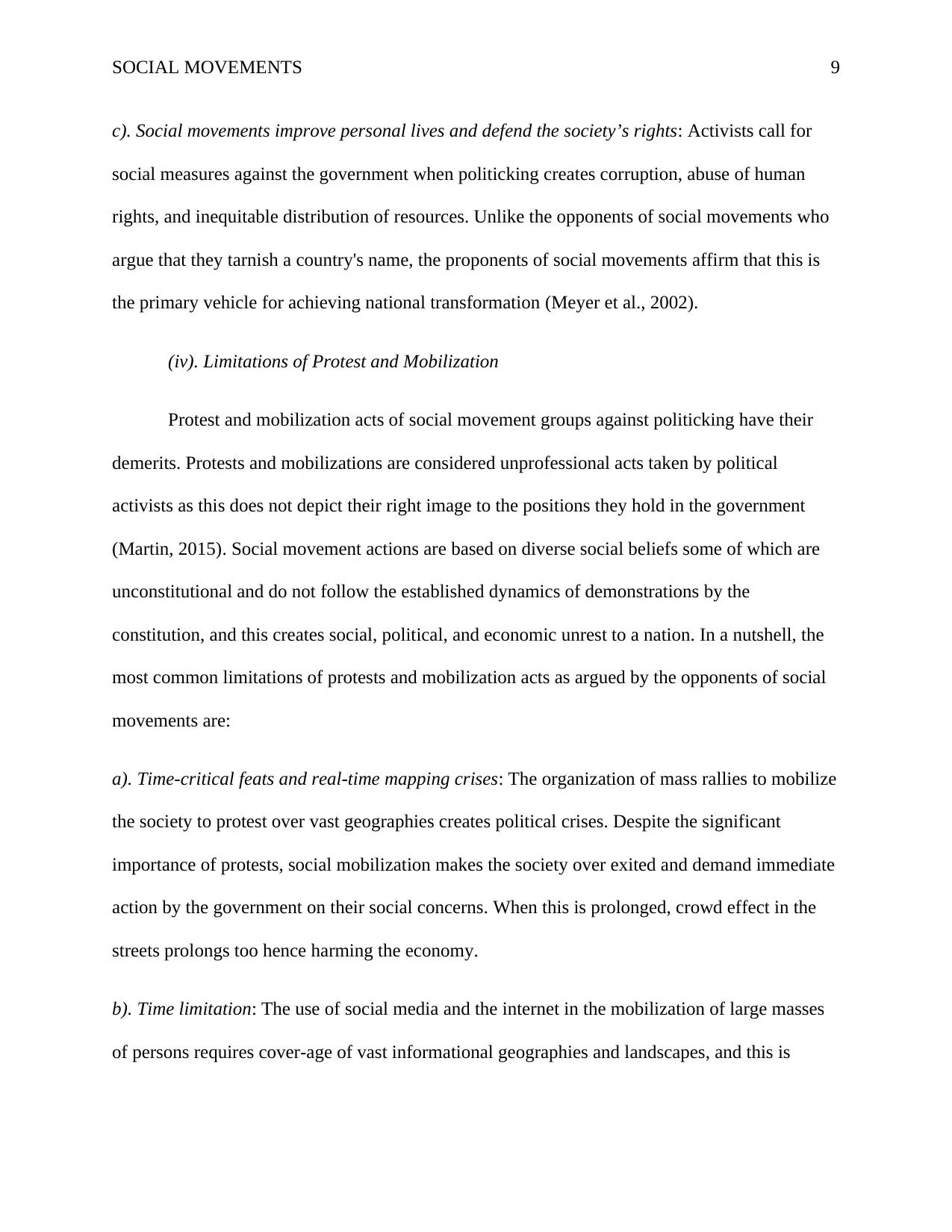
SOCIAL MOVEMENTS 9
c). Social movements improve personal lives and defend the society’s rights: Activists call for
social measures against the government when politicking creates corruption, abuse of human
rights, and inequitable distribution of resources. Unlike the opponents of social movements who
argue that they tarnish a country's name, the proponents of social movements affirm that this is
the primary vehicle for achieving national transformation (Meyer et al., 2002).
(iv). Limitations of Protest and Mobilization
Protest and mobilization acts of social movement groups against politicking have their
demerits. Protests and mobilizations are considered unprofessional acts taken by political
activists as this does not depict their right image to the positions they hold in the government
(Martin, 2015). Social movement actions are based on diverse social beliefs some of which are
unconstitutional and do not follow the established dynamics of demonstrations by the
constitution, and this creates social, political, and economic unrest to a nation. In a nutshell, the
most common limitations of protests and mobilization acts as argued by the opponents of social
movements are:
a). Time-critical feats and real-time mapping crises: The organization of mass rallies to mobilize
the society to protest over vast geographies creates political crises. Despite the significant
importance of protests, social mobilization makes the society over exited and demand immediate
action by the government on their social concerns. When this is prolonged, crowd effect in the
streets prolongs too hence harming the economy.
b). Time limitation: The use of social media and the internet in the mobilization of large masses
of persons requires cover-age of vast informational geographies and landscapes, and this is
c). Social movements improve personal lives and defend the society’s rights: Activists call for
social measures against the government when politicking creates corruption, abuse of human
rights, and inequitable distribution of resources. Unlike the opponents of social movements who
argue that they tarnish a country's name, the proponents of social movements affirm that this is
the primary vehicle for achieving national transformation (Meyer et al., 2002).
(iv). Limitations of Protest and Mobilization
Protest and mobilization acts of social movement groups against politicking have their
demerits. Protests and mobilizations are considered unprofessional acts taken by political
activists as this does not depict their right image to the positions they hold in the government
(Martin, 2015). Social movement actions are based on diverse social beliefs some of which are
unconstitutional and do not follow the established dynamics of demonstrations by the
constitution, and this creates social, political, and economic unrest to a nation. In a nutshell, the
most common limitations of protests and mobilization acts as argued by the opponents of social
movements are:
a). Time-critical feats and real-time mapping crises: The organization of mass rallies to mobilize
the society to protest over vast geographies creates political crises. Despite the significant
importance of protests, social mobilization makes the society over exited and demand immediate
action by the government on their social concerns. When this is prolonged, crowd effect in the
streets prolongs too hence harming the economy.
b). Time limitation: The use of social media and the internet in the mobilization of large masses
of persons requires cover-age of vast informational geographies and landscapes, and this is
⊘ This is a preview!⊘
Do you want full access?
Subscribe today to unlock all pages.

Trusted by 1+ million students worldwide
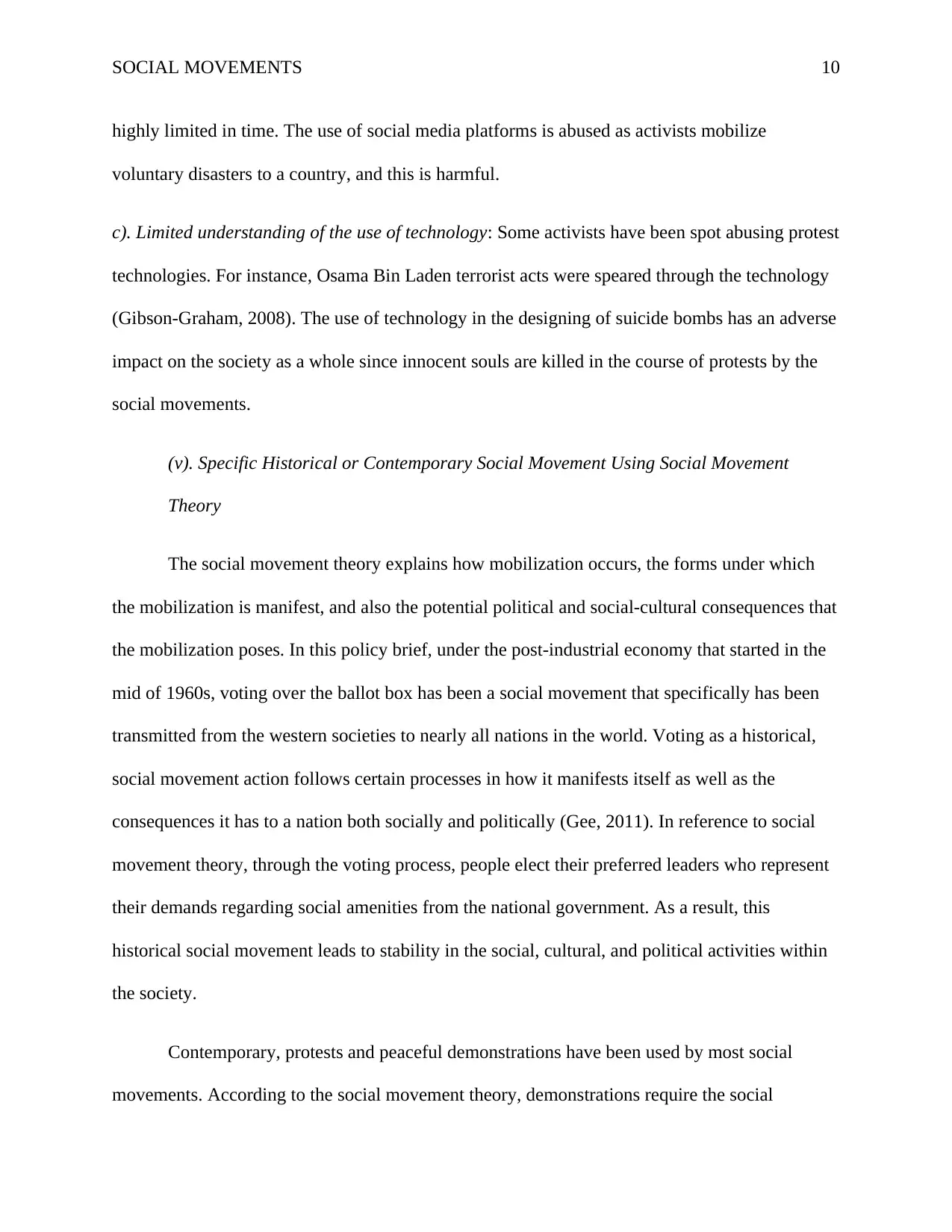
SOCIAL MOVEMENTS 10
highly limited in time. The use of social media platforms is abused as activists mobilize
voluntary disasters to a country, and this is harmful.
c). Limited understanding of the use of technology: Some activists have been spot abusing protest
technologies. For instance, Osama Bin Laden terrorist acts were speared through the technology
(Gibson-Graham, 2008). The use of technology in the designing of suicide bombs has an adverse
impact on the society as a whole since innocent souls are killed in the course of protests by the
social movements.
(v). Specific Historical or Contemporary Social Movement Using Social Movement
Theory
The social movement theory explains how mobilization occurs, the forms under which
the mobilization is manifest, and also the potential political and social-cultural consequences that
the mobilization poses. In this policy brief, under the post-industrial economy that started in the
mid of 1960s, voting over the ballot box has been a social movement that specifically has been
transmitted from the western societies to nearly all nations in the world. Voting as a historical,
social movement action follows certain processes in how it manifests itself as well as the
consequences it has to a nation both socially and politically (Gee, 2011). In reference to social
movement theory, through the voting process, people elect their preferred leaders who represent
their demands regarding social amenities from the national government. As a result, this
historical social movement leads to stability in the social, cultural, and political activities within
the society.
Contemporary, protests and peaceful demonstrations have been used by most social
movements. According to the social movement theory, demonstrations require the social
highly limited in time. The use of social media platforms is abused as activists mobilize
voluntary disasters to a country, and this is harmful.
c). Limited understanding of the use of technology: Some activists have been spot abusing protest
technologies. For instance, Osama Bin Laden terrorist acts were speared through the technology
(Gibson-Graham, 2008). The use of technology in the designing of suicide bombs has an adverse
impact on the society as a whole since innocent souls are killed in the course of protests by the
social movements.
(v). Specific Historical or Contemporary Social Movement Using Social Movement
Theory
The social movement theory explains how mobilization occurs, the forms under which
the mobilization is manifest, and also the potential political and social-cultural consequences that
the mobilization poses. In this policy brief, under the post-industrial economy that started in the
mid of 1960s, voting over the ballot box has been a social movement that specifically has been
transmitted from the western societies to nearly all nations in the world. Voting as a historical,
social movement action follows certain processes in how it manifests itself as well as the
consequences it has to a nation both socially and politically (Gee, 2011). In reference to social
movement theory, through the voting process, people elect their preferred leaders who represent
their demands regarding social amenities from the national government. As a result, this
historical social movement leads to stability in the social, cultural, and political activities within
the society.
Contemporary, protests and peaceful demonstrations have been used by most social
movements. According to the social movement theory, demonstrations require the social
Paraphrase This Document
Need a fresh take? Get an instant paraphrase of this document with our AI Paraphraser
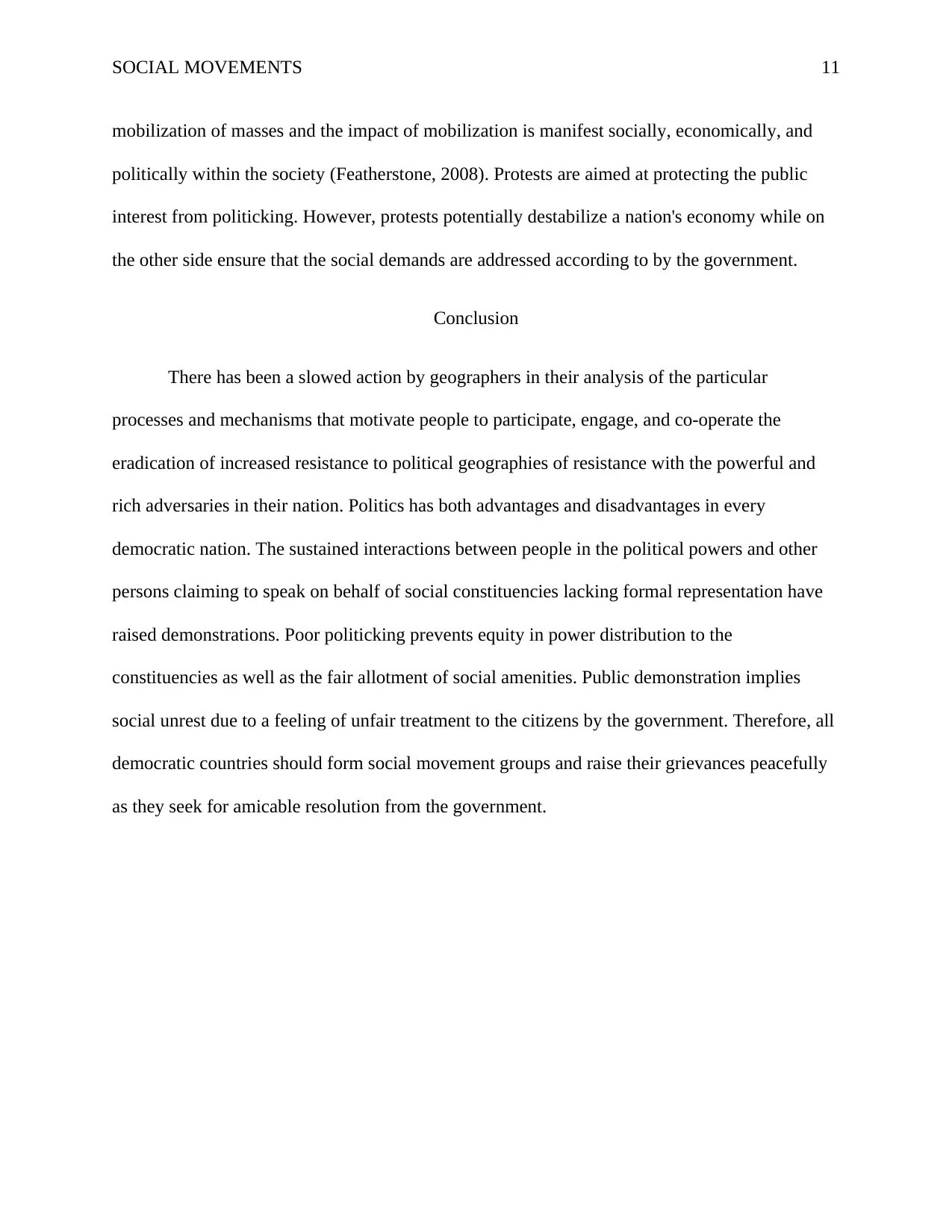
SOCIAL MOVEMENTS 11
mobilization of masses and the impact of mobilization is manifest socially, economically, and
politically within the society (Featherstone, 2008). Protests are aimed at protecting the public
interest from politicking. However, protests potentially destabilize a nation's economy while on
the other side ensure that the social demands are addressed according to by the government.
Conclusion
There has been a slowed action by geographers in their analysis of the particular
processes and mechanisms that motivate people to participate, engage, and co-operate the
eradication of increased resistance to political geographies of resistance with the powerful and
rich adversaries in their nation. Politics has both advantages and disadvantages in every
democratic nation. The sustained interactions between people in the political powers and other
persons claiming to speak on behalf of social constituencies lacking formal representation have
raised demonstrations. Poor politicking prevents equity in power distribution to the
constituencies as well as the fair allotment of social amenities. Public demonstration implies
social unrest due to a feeling of unfair treatment to the citizens by the government. Therefore, all
democratic countries should form social movement groups and raise their grievances peacefully
as they seek for amicable resolution from the government.
mobilization of masses and the impact of mobilization is manifest socially, economically, and
politically within the society (Featherstone, 2008). Protests are aimed at protecting the public
interest from politicking. However, protests potentially destabilize a nation's economy while on
the other side ensure that the social demands are addressed according to by the government.
Conclusion
There has been a slowed action by geographers in their analysis of the particular
processes and mechanisms that motivate people to participate, engage, and co-operate the
eradication of increased resistance to political geographies of resistance with the powerful and
rich adversaries in their nation. Politics has both advantages and disadvantages in every
democratic nation. The sustained interactions between people in the political powers and other
persons claiming to speak on behalf of social constituencies lacking formal representation have
raised demonstrations. Poor politicking prevents equity in power distribution to the
constituencies as well as the fair allotment of social amenities. Public demonstration implies
social unrest due to a feeling of unfair treatment to the citizens by the government. Therefore, all
democratic countries should form social movement groups and raise their grievances peacefully
as they seek for amicable resolution from the government.
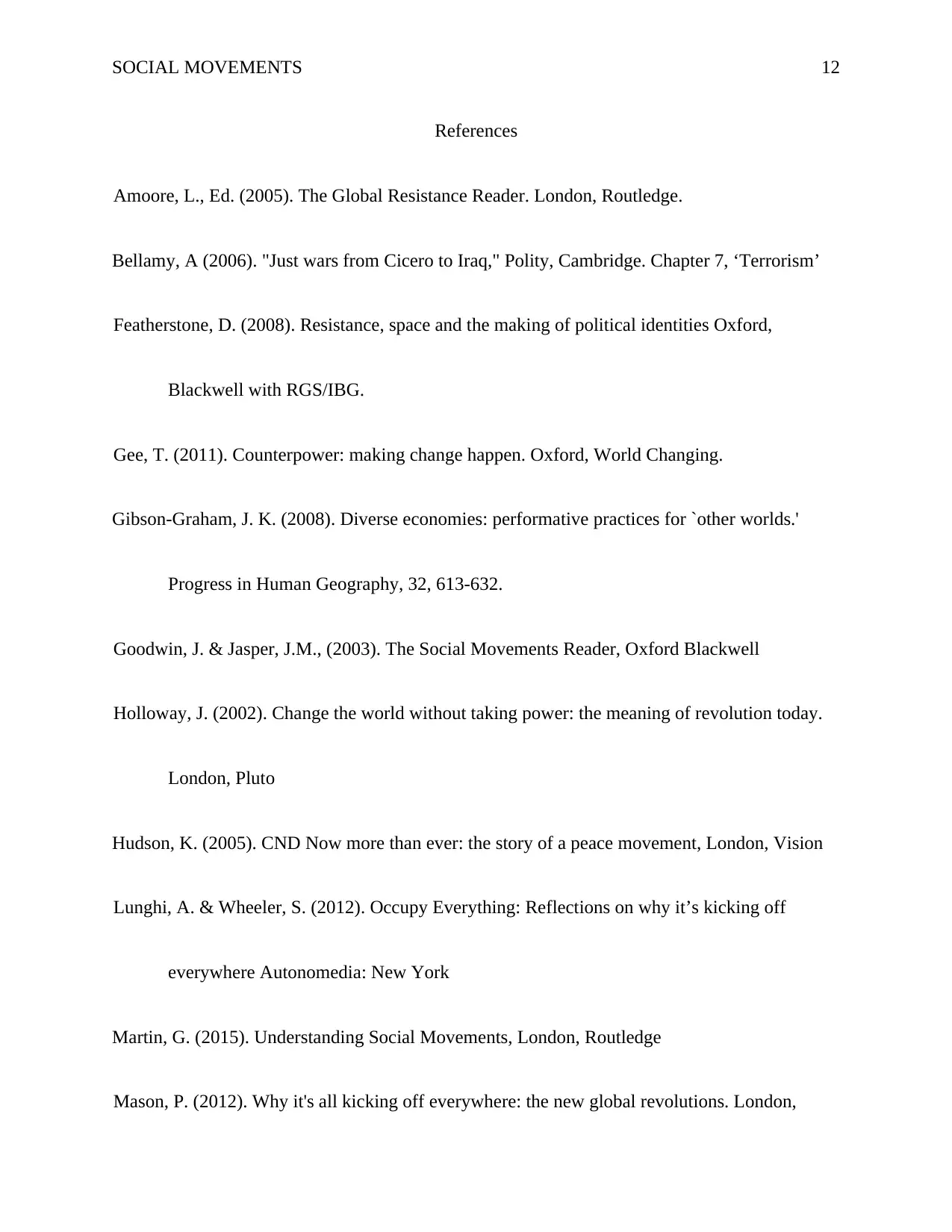
SOCIAL MOVEMENTS 12
References
Amoore, L., Ed. (2005). The Global Resistance Reader. London, Routledge.
Bellamy, A (2006). "Just wars from Cicero to Iraq," Polity, Cambridge. Chapter 7, ‘Terrorism’
Featherstone, D. (2008). Resistance, space and the making of political identities Oxford,
Blackwell with RGS/IBG.
Gee, T. (2011). Counterpower: making change happen. Oxford, World Changing.
Gibson-Graham, J. K. (2008). Diverse economies: performative practices for `other worlds.'
Progress in Human Geography, 32, 613-632.
Goodwin, J. & Jasper, J.M., (2003). The Social Movements Reader, Oxford Blackwell
Holloway, J. (2002). Change the world without taking power: the meaning of revolution today.
London, Pluto
Hudson, K. (2005). CND Now more than ever: the story of a peace movement, London, Vision
Lunghi, A. & Wheeler, S. (2012). Occupy Everything: Reflections on why it’s kicking off
everywhere Autonomedia: New York
Martin, G. (2015). Understanding Social Movements, London, Routledge
Mason, P. (2012). Why it's all kicking off everywhere: the new global revolutions. London,
References
Amoore, L., Ed. (2005). The Global Resistance Reader. London, Routledge.
Bellamy, A (2006). "Just wars from Cicero to Iraq," Polity, Cambridge. Chapter 7, ‘Terrorism’
Featherstone, D. (2008). Resistance, space and the making of political identities Oxford,
Blackwell with RGS/IBG.
Gee, T. (2011). Counterpower: making change happen. Oxford, World Changing.
Gibson-Graham, J. K. (2008). Diverse economies: performative practices for `other worlds.'
Progress in Human Geography, 32, 613-632.
Goodwin, J. & Jasper, J.M., (2003). The Social Movements Reader, Oxford Blackwell
Holloway, J. (2002). Change the world without taking power: the meaning of revolution today.
London, Pluto
Hudson, K. (2005). CND Now more than ever: the story of a peace movement, London, Vision
Lunghi, A. & Wheeler, S. (2012). Occupy Everything: Reflections on why it’s kicking off
everywhere Autonomedia: New York
Martin, G. (2015). Understanding Social Movements, London, Routledge
Mason, P. (2012). Why it's all kicking off everywhere: the new global revolutions. London,
⊘ This is a preview!⊘
Do you want full access?
Subscribe today to unlock all pages.

Trusted by 1+ million students worldwide
1 out of 14
Your All-in-One AI-Powered Toolkit for Academic Success.
+13062052269
info@desklib.com
Available 24*7 on WhatsApp / Email
![[object Object]](/_next/static/media/star-bottom.7253800d.svg)
Unlock your academic potential
Copyright © 2020–2025 A2Z Services. All Rights Reserved. Developed and managed by ZUCOL.

